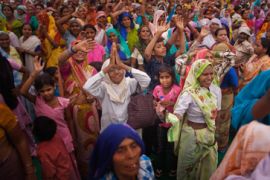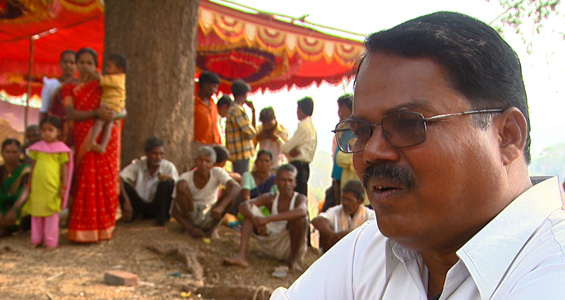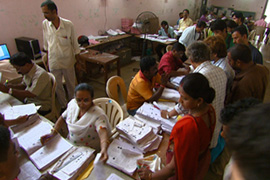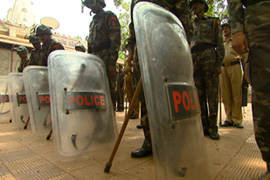The world’s biggest democratic show
Four million civil servants, two million police and 714 million registered voters.

 |
| Ramesh Kantela, a headmaster, says politicians are interested in rural India only at election time |
It is a humbling experience to see the Indian election machine up close.
In a run-down school hall in Mumbai’s northern suburbs, people are registering to vote, jostling round the tables, waving their forms above their heads to try to get the attention of the officials.
It is a low-tech, laborious operation, carried out with painstaking attention to detail, but this is the greatest democratic show on earth.
| Special report |
 |
Fans circle slowly, and ineffectually, far overhead, and an official wipes sweat from his brow, before attaching another passport photo to a form.
He is just one of the almost four million civil servants who make this process work across the country, and he is dwarfed by the pile of dog-eared old forms that threaten to topple off his desk.
The man in charge at this registration centre is Sanjay Sarvade. This is the fifth election he has worked on, and he is confident everything is under control.
“The Election Commission is very clear about the code of conduct … we’re confident there will be no problem at all on any side, there will be no law and order problem, and things will go very properly,” he says.
Policing the elections
The Election Commission of India runs a well-oiled machine, and is generally held in high regard. But it is only part of the equation. It plays a crucial role in ensuring everything runs smoothly, but it cannot guarantee a free and fair process by itself.
The other crucial part of the equation in the election process is India’s police force.
They have the heavy responsibility of ensuring that voting takes place in a safe and secure environment.
More than two million of them will be deployed on election duty, and they are of variable quality.
The lower ranks are poorly paid, and parts of the force are riddled with corruption.
In Mumbai’s police headquarters, we caught up with Suprakash Chakravarty, the local director-general, who is responsible for the policing of the election across the large and populous state of Maharashtra.
In this one state, Chakravarty has to worry about a possible repeat of the terror attacks which hit Mumbai last November, not to mention religious and communal tensions, and, in the eastern part of the state, a full-blown Maoist insurgency.
But as he is grilled by the local press on these issues, he cuts a relaxed figure, smiling and joking.
He tells us he will be sending reinforcements to the regions where the Maoists are active, but he cannot reveal all his plans “because then you’ll go and print them, and the terrorists will read all about it”.
Sufficient numbers
But even if Chakravarty’s plans do work out, will the electorate turn out in sufficient numbers to make this process credible?
History suggests that they will; turnout in recent Indian general elections has been in the region of a respectable 60 per cent.
Surprisingly, however, the more educated and affluent people in India’s cities seem distinctly less interested in elections than their poorer counterparts out in the countryside.
 |
| Registering to vote can be a laborious process |
In the 2004 elections, turn-out in urban areas was, on average, five per cent lower than that in the countryside.
We attended a noisy carnival, in the wealthy Mumbai suburb of Bandra, intended to drum up enthusiasm for the election among younger voters.
Gerson da Cunha, a social activist, says that the youth and middle class have “lost faith” in the system, because Indian politicians are perceived as hopelessly corrupt, even criminal.
Such perceptions have made Indian democracy weaker.
One evening last week I was with an Indian colleague when we bumped into a well-known official from a political party in the lobby of an expensive Mumbai hotel.
He was carrying a large parcel under his arm.
“Sweets?” enquired my colleague, with a knowing look.
The official chuckled, “yes, lots and lots of sweets”.
Money talks in Indian elections.
Rural vote
Out in the countryside, where voter turn-out is not such a problem, the integrity of the election process is sometimes in doubt.
We travelled some 150km north of Mumbai, to the Warli tribal area where we found Ramesh Kantela, a local headmaster, under a tree, giving an ad-hoc lesson on democracy to the assembled villagers.
 |
| More than two million police officers will be deployed during the election |
He was explaining how the villagers should use the new, electronic voting machines.
The villagers listened attentively, but afterwards Kantela was sceptical that this poor, remote community, really understands its democratic rights.
“The people here will always vote for whom the village leaders tell them to,” he explains.
“And the parties say they will beat people who don’t vote for them … .
“Only in the election time do the party workers come to the village, promising this and that, but after the election nobody is coming in this area.”
Kantela had put his finger on the problem. While in theory all Indians have an equal say in who runs their country, in practise it will take a lot more than regular elections for the poor and marginalised of this country to be truly empowered.
